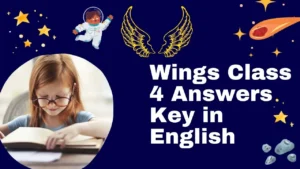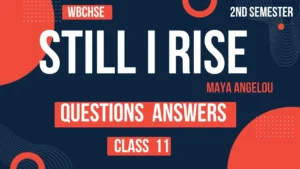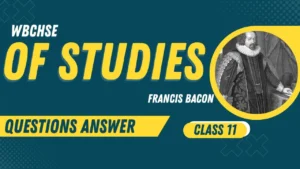It is essential for Class 11 WBCHSE 1st Semester 2025 students to thoroughly understand the “All the World’s a Stage MCQ Questions Answers” for success in the exam. This comprehensive guide provides MCQ questions with answers and a summary to help students grasp the key concepts and themes of the poem. It also includes practice questions aligned with the book “Paradise,” the Higher Secondary English Collection for Class 11 English – A, New Curriculum.
Summary of ‘All the World’s a Stage’:
Para 1:
The poem “All the World’s a Stage” is an excerpt from William Shakespeare’s play As You Like It. It is spoken by the character Jaques in Act 2, Scene 7 of the play.
Para 2:
Shakespeare begins by saying that human life is like a stage, and all people are merely actors playing different roles at various stages of their lives. He compares life to a play where everyone has a part to perform. People enter the stage when they are born and exit when they die. Shakespeare divides human life into seven stages. The seven stages are: (1) infancy, (2) schoolboy, (3) lover, (4) soldier,(5) justice, (6) old age, and finally, (7) a second childhood that leads to death. Each stage represents a different phase of life, with its unique characteristics and challenges.
Para 3:
First, there is the infant, who cries and needs constant care. Then, the child becomes a schoolboy, who reluctantly goes to school. The next stage is the lover, full of intense emotions, writing poems, and dreaming of love.
Para 4:
After that, the person becomes a soldier, eager to protect his honor, even if it means risking his life. In the next stage, the man becomes a judge, wise and fair, enjoying the respect he has earned.
Para 5:
As he grows older, he becomes frail and thin, wearing glasses and clothes that are too loose. In the final stage, he becomes like a child again, losing his senses and becoming dependent on others, until he eventually passes away.
People also ask
All the World’s a Stage MCQ Questions Answers
Here are the most important MCQ questions answers based on “The Seven Ages of Man(All the World’s a Stage)” by William Shakespeare:
All the World’s a Stage MCQ Set 1:
Choose the correct option from the given alternatives.
1. What metaphor does Shakespeare use to describe life in “The Seven Ages of Man”?
A) A battlefield
B) A stage
C) A journey
D) A dream
Answer: B) A stage
2. How many ages of man are described in the poem?
A) Five
B) Six
C) Seven
D) Eight
Answer: C) Seven
3. Which age of man is described as “mewling and puking in the nurse’s arms”?
A) The schoolboy
B) The infant
C) The lover
D) The soldier
Answer: B) The infant
4. In which age does man “creep like snail unwillingly to school”?
A) The infant
B) The schoolboy
C) The lover
D) The justice
Answer: B) The schoolboy
5. What is the lover described as doing in “The Seven Ages of Man”?
A) Sighing like a furnace
B) Fighting battles
C) Studying diligently
D) Growing old
Answer: A) Sighing like a furnace
6. What is the soldier seeking, according to the poem?
A) Love
B) Wealth
C) Reputation
D) Wisdom
Answer: C) Reputation
All the World’s a Stage MCQ Set 2:
Choose the correct option from the given alternatives.
7. What characteristic is associated with the justice in the poem?
A) Youthful vigor
B) Wisdom
C) Vanity
D) Innocence
Answer: B) Wisdom
8. What does the justice’s “fair round belly” suggest?
A) Old age
B) Wealth and contentment
C) Weakness
D) Athleticism
Answer: B) Wealth and contentment
9. The sixth age of man is referred to as the ________.
A) Pantaloon
B) Justice
C) Schoolboy
D) Infant
Answer: A) Pantaloon
10. In the final stage, man is described as being without ________.
A) Family
B) Money
C) Power
D) Teeth, eyes, taste, and everything
Answer: D) Teeth, eyes, taste, and everything
11. What does “pantaloon” symbolize in the sixth age?
A) Youth
B) Wisdom
C) Frailty and old age
D) Strength
Answer: C) Frailty and old age
People also ask
12. What happens to man’s voice in the sixth age?
A) It becomes louder
B) It turns back to a childish treble
C) It deepens
D) It remains unchanged
Answer: B) It turns back to a childish treble
All the World’s a Stage MCQ Set 3:
Choose the correct option from the given alternatives.
13. In the soldier stage, what kind of beard does the man have?
A) Clean-shaven
B) Bearded like a pard
C) Long and flowing
D) No beard
Answer: B) Bearded like a pard
14. Which age of man is associated with “seeking the bubble reputation”?
A) The infant
B) The lover
C) The soldier
D) The justice
Answer: C) The soldier
15. What is implied by the phrase “second childishness”?
A) A return to infancy
B) A time of great wisdom
C) A period of independence
D) A new beginning
Answer: A) A return to infancy
16. What does “sans everything” mean in the context of the final stage?
A) With everything
B) Without anything
C) Gaining wisdom
D) Possessing wealth
Answer: B) Without anything
17. In which stage is man described as “jealous in honor”?
A) The lover
B) The soldier
C) The justice
D) The infant
Answer: B) The soldier
18. The phrase “made to his mistress’ eyebrow” refers to which age?
A) The infant
B) The schoolboy
C) The lover
D) The pantaloon
Answer: C) The lover
All the World’s a Stage MCQ Set 4:
Choose the correct option from the given alternatives.
19. What is the significance of the “bubble reputation”?
A) It represents long-lasting fame
B) It symbolizes fleeting and temporary glory
C) It indicates a solid reputation
D) It signifies wealth
Answer: B) It symbolizes fleeting and temporary glory
20. In which age is man “sighing like a furnace”?
A) The infant
B) The schoolboy
C) The lover
D) The soldier
Answer: C) The lover
21. What does the phrase “eyes severe and beard of formal cut” signify in the justice stage?
A) Youthful vigor
B) Wealth and wisdom
C) Authority and seriousness
D) Vanity
Answer: C) Authority and seriousness
22. Which age is associated with “wise saws and modern instances”?
A) The schoolboy
B) The lover
C) The justice
D) The pantaloon
Answer: C) The justice
23. What does “creeping like snail” symbolize in the schoolboy stage?
A) Laziness
B) Excitement
C) Reluctance
D) Courage
Answer: C) Reluctance
24. Which stage reflects the physical decline of man?
A) The soldier
B) The justice
C) The pantaloon
D) The lover
Answer: C) The pantaloon
All the World’s a Stage MCQ Set 5:
Choose the correct option from the given alternatives.
25. What does the “cannon’s mouth” represent in the soldier stage?
A) War and danger
B) Peace and prosperity
C) Education and learning
D) Love and romance
Answer: A) War and danger
26. In which age does man become “full of strange oaths”?
A) The infant
B) The schoolboy
C) The lover
D) The soldier
Answer: D) The soldier
27. The phrase “turning again toward childish treble” indicates which stage?
A) The lover
B) The soldier
C) The pantaloon
D) The infant
Answer: C) The pantaloon
28. What does “with spectacles on nose” signify in the sixth age?
A) Vanity
B) Weak eyesight and old age
C) Intelligence
D) Youthful exuberance
Answer: B) Weak eyesight and old age
29. Which stage is the man in when he is “full of wise saws”?
A) The infant
B) The schoolboy
C) The lover
D) The justice
Answer: D) The justice
30. “Seeking the bubble reputation” is an action associated with which age?
A) The lover
B) The soldier
C) The pantaloon
D) The justice
Answer: B) The soldier
MCQ Questions All the World’s a Stage Set 6:
Choose the correct option from the given alternatives.
31. The word “mewling” in the infant stage refers to ________.
A) Laughing
B) Crying
C) Sleeping
D) Playing
Answer: B) Crying
32. What is the final stage of man described as in the poem?
A) Second childhood and mere oblivion
B) Full of energy
C) Wealthy and wise
D) Youthful and strong
Answer: A) Second childhood and mere oblivion
33. What does “shining morning face” refer to in the schoolboy stage?
A) Happiness
B) Fear
C) Innocence and freshness
D) Anger
Answer: C) Innocence and freshness
34. Which age is man in when he “pipes and whistles in his sound”?
A) The schoolboy
B) The pantaloon
C) The justice
D) The soldier
Answer: B) The pantaloon
35. The “mistress’ eyebrow” in the lover stage symbolizes ________.
A) Wealth
B) Power
C) Beauty and attraction
D) Wisdom
Answer: C) Beauty and attraction
36. What does “shrunk shank” symbolize in the sixth age?
A) Youthfulness
B) Physical deterioration
C) Strength
D) Wisdom
Answer: B) Physical deterioration
Questions All the World’s a Stage Set 7:
Choose the correct option from the given alternatives.
37. What does the “second childishness” signify in the final stage?
A) Rebirth
B) Return to dependency and helplessness
C) Wisdom and understanding
D) A new beginning
Answer: B) Return to dependency and helplessness
38. Which of the following is NOT a characteristic of the justice?
A) Fair round belly
B) Eyes severe
C) Bearded like the pard
D) Full of wise saws
Answer: C) Bearded like the pard
39. The phrase “sans teeth, sans eyes, sans taste, sans everything” refers to which stage?
A) The lover
B) The soldier
C) The pantaloon
D) Second childishness
Answer: D) Second childishness
40. Which age reflects a man’s peak of power and influence?
A) The infant
B) The schoolboy
C) The justice
D) The pantaloon
Answer: C) The justice
41. What does the phrase “with spectacles on nose” indicate?
A) Vanity
B) A sign of old age and wisdom
C) Youthful exuberance
D) Wealth
Answer: B) A sign of old age and wisdom
42. “Mewling and puking” in the nurse’s arms represents which stage?
A) The schoolboy
B) The lover
C) The infant
D) The pantaloon
Answer: C) The infant
MCQ All the World’s a Stage Set 8:
Choose the correct option from the given alternatives.
43. What is the significance of “turning again toward childish treble” in the pantaloon stage?
A) It signifies the reawakening of youth
B) It indicates a return to childishness in old age
C) It shows wisdom
D) It reflects strength
Answer: B) It indicates a return to childishness in old age
44. Which stage is associated with “a world too wide for his shrunk shank”?
A) The lover
B) The soldier
C) The pantaloon
D) The infant
Answer: C) The pantaloon
45. What does “seeking the bubble reputation even in the cannon’s mouth” suggest?
A) Cowardice
B) Reckless bravery
C) Wisdom
D) Cunning
Answer: B) Reckless bravery
46. The justice’s “eyes severe” reflect which trait?
A) Anger
B) Authority and wisdom
C) Innocence
D) Cowardice
Answer: B) Authority and wisdom
Multiple Choice Questions All the World’s a Stage Set 9:
Choose the correct option from the given alternatives.
47. In the soldier stage, why is the man described as “jealous in honor”?
A) He values his reputation and is quick to defend it
B) He is envious of others
C) He desires wealth
D) He seeks love
Answer: A) He values his reputation and is quick to defend it
48. What is suggested by the term “furnace” in the lover stage?
A) Coldness
B) Burning passion and emotion
C) Wisdom
D) Strength
Answer: B) Burning passion and emotion
49. In which stage does the man “creep like snail unwillingly to school”?
A) The lover
B) The soldier
C) The schoolboy
D) The pantaloon
Answer: C) The schoolboy
50. What is the overarching theme of “The Seven Ages of Man”?
A) The inevitability of death
B) The cyclical nature of life
C) The futility of human endeavors
D) The pursuit of happiness
Answer: B) The cyclical nature of life
51. All the world’s a stage is an extended metaphor for ________.
A) the life shown in well known plays.
B) seeing the well known plays.
C) life of well known actors.
D) life of man that comes to an end.
Answer: A) the life shown in well known plays.
52. All ‘have their exits and their entrances’. Exits and entrances refer to ________.
A) birth and death
B) beginning and end of play
C) coming and going of actors
D) death and birth
Answer: A) birth and death
MCQ questions answers All the World’s a Stage Set 10:
Choose the correct option from the given alternatives.
53. The seven roles that a man plays correspond to his
A) chronological age in life
B) desires
C) mental development through life
D) idea of a perfect life
Answer: A) chronological age in life
54. And one man in his time plays many parts……
Replace the underlined word with the correct option which has the same meaning as used in the given lines.
A) scenes
B) roles
C) jobs.
D) tasks.
Answer: B) roles
55. The word ‘merely’ reveals that the poet regards/views human life as ________.
A) impressive
B) inconsequential
C) magnificent
D) uninspiring
Answer: D) uninspiring
56. Pick the option that does not match with the poetic device used in the phrase ‘All the world’s a stage’.
A) A thing of beauty is a joy forever.
B) The lightning was fireworks in the sky.
C) Heavy is the heart that wears the crown.
D) The movie was a roller coaster ride of emotions.
Answer: A) A thing of beauty is a joy forever.
57. The tone of the poet in line ‘His youthful hose, well saved, a world too wide/ For his shrunk shank’ is largely
A) nostalgic
B) humorous
C) pessimistic
D) regretful
Answer: B) humorous
58. Select the option that displays the changes very old age witnesses.
i. Round belly
ii. Full of wisdom
iii. Loss of vigour
iv. Lean & bony
v Hoarse voice
A) i, iii, iv
B) ii, iii, v
C) ii, iii, iv
D) iii, iv, v
Answer: D) iii, iv, v
These MCQs cover a wide range of important themes, symbols, and imagery in “The Seven Ages of Man,” providing a comprehensive review of the poem.






